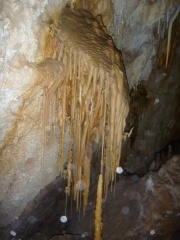Calcite (Inventory)/Shield
From LagWiki
| Line 2: | Line 2: | ||
The '''Shield''' field of the [[Calcite (Inventory)|Calcite]] section should be used to record stations where a shield is found. | The '''Shield''' field of the [[Calcite (Inventory)|Calcite]] section should be used to record stations where a shield is found. | ||
| - | A shield appears as two parallel plates of calcite separated by a thin crack. The crack may not be visible at the edges because it is too thin or obscured. Shields are usually flat on top and usually oval in shape. They grow outward at their edges and can be attached to bedrock or other speleothems (usually [[Calcite (Inventory)/Column|columns]]). They are rarely parallel to the floor and most often have a noticeable slant. They are often decorated underneath with [[ | + | A shield appears as two parallel plates of calcite separated by a thin crack. The crack may not be visible at the edges because it is too thin or obscured. Shields are usually flat on top and usually oval in shape. They grow outward at their edges and can be attached to bedrock or other speleothems (usually [[Calcite (Inventory)/Column|columns]]). They are rarely parallel to the floor and most often have a noticeable slant. They are often decorated underneath with [[Calcite (Inventory)/Stalactite|stalactites]]. These could reach the floor forming a column between the shield and the floor. Shields may also be decorated on top by secondary speleothems such as [[Calcite (Inventory)/Stalagmite|stalagmites]]. True shields are rare and occasionally other features such as a flat rock or welts from a crack in a column are mistakenly identified as shields. |
==References== | ==References== | ||
Revision as of 17:23, 29 April 2011
The Shield field of the Calcite section should be used to record stations where a shield is found.
A shield appears as two parallel plates of calcite separated by a thin crack. The crack may not be visible at the edges because it is too thin or obscured. Shields are usually flat on top and usually oval in shape. They grow outward at their edges and can be attached to bedrock or other speleothems (usually columns). They are rarely parallel to the floor and most often have a noticeable slant. They are often decorated underneath with stalactites. These could reach the floor forming a column between the shield and the floor. Shields may also be decorated on top by secondary speleothems such as stalagmites. True shields are rare and occasionally other features such as a flat rock or welts from a crack in a column are mistakenly identified as shields.
References
- Palmer, Arthur N. (2007) Cave Geology CAVE BOOKS, Dayton, OH pp 286-287 ISBN-13: 978-0-939748-66-2, ISBN-10: 0-939748-66-5

